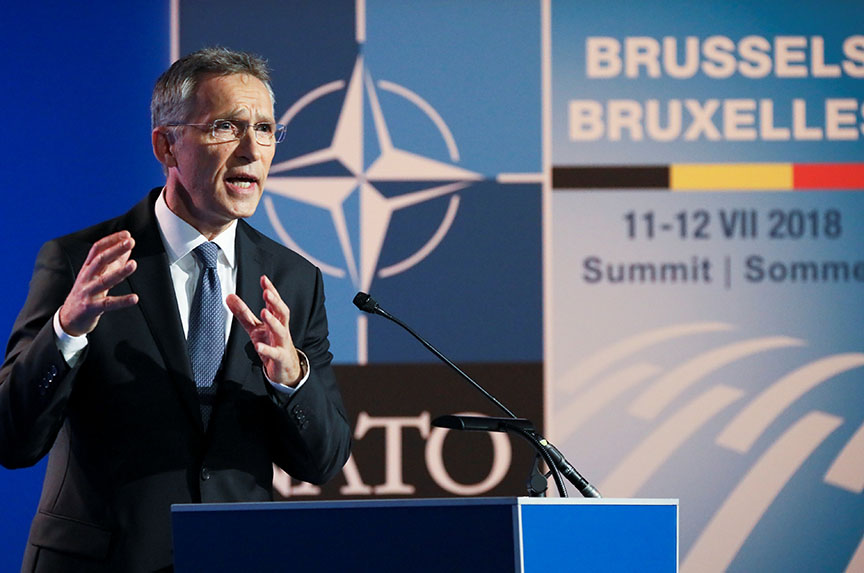
Interview with NATO’s James Appathurai
It’s no secret people are nervous at NATO’s headquarters in Brussels, and not just with jitters that would be normal ahead of any major event with the eyes of the world upon it. With twenty-nine heads of state and government on their way to the Alliance’s sleek new headquarters, there are many variables, the most unpredictable being US President Donald J. Trump. The US leader continues his tirade against European under-spenders, who are angry over US trade policies. The Alliance is doing everything it can to avoid a category G7 catastrophe.
The summit has been choreographed as carefully as possible. All documents to be signed on July 11 and 12 have already been drafted and unanimously accepted at the working level. US National Security Advisor John Bolton has reportedly declared himself satisfied with the text of the final communique, reducing the potential for a last-minute rejection by Trump, and it will be signed in the first of the four sessions in the afternoon of July 11. In the room where the North Atlantic Council meets, there is a complete ban on electronics, including all phones. There will be no tweets.
James Appathurai, familiar to many as NATO’s spokesman from 2004 to 2010, now has the wordy title of deputy assistant secretary general for political affairs and security policy. Appathurai acknowledges the situation is tense. “Of course we’re all concerned about the context, we’re all concerned about what might come,” he said. “What we can do, first and foremost, is focus on the substance.”
Substance—NATO’s record of transformation over the last four years and its ambitions going forward—has been overshadowed by the US president’s single-minded and furious focus on some European governments’ inadequate defense spending. No one can say he doesn’t have a point; all the then-twenty-eight allies did agree at the 2014 Wales Summit to. So far, only eight have reached the target, a number that, while expected to double by the target date of 2024, still will not include all countries. Nevertheless, however helpful it was at first for bumping up budgets, Trump’s divisive rhetoric is seen by many as becoming counterproductive; it has helped fill NATO coffers faster, but also drained the well of goodwill.
Still, Appathurai doesn’t fault Trump for taking a sharper tone on the issue, explaining that he’s heard complaints on Capitol Hill for years about the fact “American troops are at a higher state of readiness and capability to come to defend Europe than Europeans in general are to defend themselves…how come we’re paying for Europeans’ defense while they get free medical care and a one-month vacation?”
He suggested an implicit danger in dismissing the depth of this discontent, noting that this is a personal and not official viewpoint. “It is very important that we don’t end up in a situation where the United States gets so frustrated that it does start to feel like it needs to take other decisions,” he said. “That would be a terrible outcome for everyone. So what we need to do is demonstrate that burdens are being shared fairly.”
Appathurai believes out of this funding issue that Trump has made so contentious, “We have a good news story to tell, if everyone’s willing to hear it.” He said at the summit, NATO Secretary General Jens Stoltenberg will pull out his beloved charts for the leaders. “He can legitimately show all the heads there that the decline has been reversed and that there is a steady incremental increase in the amount of money,” Appathurai said. “By next year or the end of this year, there will be $80 billion more being put into defense than there would have been prior to the increases that started in 2014. That’s actually quite a substantial amount of money.”
At the same time, Appathurai hopes these demonstrations will satisfy Trump so other issues can come to the fore, among them, the ongoing “hot war” in eastern Ukraine. Trump alarmed many with his remark that about recognizing Moscow’s annexation of Ukraine’s Crimea region in 2014.
But there will be no budging in Brussels, Appathurai said. “The NATO position—to which the United States has signed up,” he noted, “is that we will not recognize [the annexation of] Crimea.” Diplomats say that language will be reinforced in the summit communique and that the entire section on Russia was among the least contentious subjects.
That’s more important than ever for NATO, which was very worried Trump would meet Russian President Vladimir Putin before this summit. The Alliance has welcomed Trump’s meeting with Putin in Helsinki on July 16. “If President Trump is having that discussion with President Putin on the basis of a good strong NATO summit, his negotiating position is all the stronger,” Appathurai said.
There may be more than one “if” in that sentence.
Teri Schultz is a freelance journalist based in Brussels. Follow her on Twitter @terischultz.
Image: NATO Secretary General Jens Stoltenberg spoke at a news conference in Brussels on July 10 ahead of NATO’s summit that will gather leaders of the twenty-nine Alliance members on July 11 and 12. (Reuters/Reinhard Krause)
